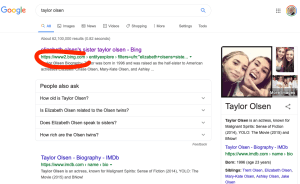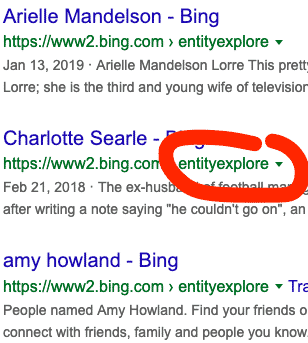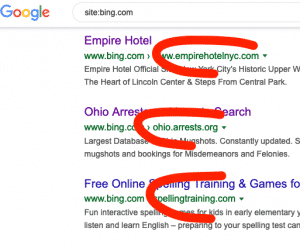Here we go again. I’ve written about this before and Google again is indexing search engine results pages in Bing.com. When I pointed it out, Google eventually removed it. And, better yet, Google is also indexing and ranking those pages and pages that redirect to other URLs. What’s odd, is that Google’s actually indexing pages that appear to be on the Bing.com domain but they’re redirecting to another site.
Take a look at the search engine result in Google for “Taylor Olsen”. Granted she’s not a household name, but the actress does have a Knowledge Graph entry. The number one search result in Google.com is a Bing.com search engine results page. The Bing search engine results page even outranks the IMDB page for “Taylor Olsen”.
If you look at the URL, it’s clearly a search engine result from the www2.bing dot com subdomain.
Over 600,000 Bing Search Results Pages Indexed
Not only that, there are over 600,000 search engine results pages of Bing in Google’s search engine results according to a site:www2.bing.com search query at Google. Other notable Bing search queries that are ranking in Google currently:
2001 presidential election
Kristin J. White
eddie stubbs
bill haller
Arielle Mandelson
Entities are Involved
Based on my preliminary review of the search engine results from Bing that are being indexed (and actually rank in Google), it appears that these are somehow related to Entities. Take a look at some of the pages of Bing’s results that are ranking in Google:
This is interesting to me, as it actually shows that Google appears to be “liking” entities. This may be one reason that these pages are ranking so well in Google, as each of these are tied to entities specifically. In fact, for all of the search queries that I reviewed, each one of the has an entity. Or at least the majority of them do. If you look at the URLs of Bing’s search results that are ranking, each of these have the “type=entityfull” in the URL. So, Bing’s doing something with entities here–and it’s working to rank well in Google.
Entity SEO
For the past few months I have been studying what I call “Entity SEO”. If you’re not familiar with it, you should be. I am seeing some really good results by working with clients to make sure that their company and any of the employees (such as the CEO, CMO, CFO, and C-level executives) are in the Knowledge Graph. I personally have the benefit of being a part of the Knowledge Graph (search Google for “Bill Hartzer” and you’ll see my KG entry on the right side of the search engine results). I do believe being in the Knowledge Graph helps–especially having a name and or company name identified as an Entity. There are ways to get your company name or your personal name into the Knowledge Graph, and I won’t go into the specifics here.
Entity SEO I believe was first coined by my friend Dixon Jones a while back when he started talking about Entity SEO on his blog. Dixon will be talking more about Entity SEO at the State of Search conference in Dallas.
Bing Redirected URLs in Google’s Search Results
What’s even more disturbing to me is that Bing’s search engine results pages, which are essentially redirects for certain search queries, are, in fact, being indexed in Google’s search engine results. Let’s take a look at an example:
The original search engine result for a site:bing.com search in Google reveals some interesting results. In fact, if you take a look at the results you’ll see several Bing results but they reference a domain name. For example, site:bing.com shows a result for the Empire Hotel (empirehotelnyc.com) and it’s clearly on Bing.com. But, when you click the link in the Google search results you are redirected to empirehotelnyc.com, and NOT to the Bing.com domain. That’s very odd, and it appears that it’s something to do with they way Bing.com is redirecting visitors to that domain. For Bing’s pages to be in Google’s search engine results pages, Bing is doing something weird with their redirects, and Google appears to have an issue with them. For example, this is the what happens when you click on a Bing search results page that’s indexed in Google:
HTTP/1.1 302 Found => Location => http://www.empirehotelnyc.com/ Access-Control-Allow-Origin => * X-MSEdge-Ref => Ref A: 0D15606E542A44B79F164B8C8D8D936C Ref B: ASHEDGE0721 Ref C: 2019-10-18T14:48:23Z Set-Cookie => _EDGE_V=1; path=/; httponly; expires=Wed, 11-Nov-2020 14:48:23 GMT; domain=bing.com Date => Fri, 18 Oct 2019 14:48:22 GMT Connection => close Content-Length => 0
It appears that Google has an issue with the way they’re handling 302 redirects. What I can tell you, though, is that there appears to be several redirects involved here, just preliminarily clicking on the “back” button reveals that the redirect is a 302 redirect but then another redirect to www and then to the final destination, which is the empirehotelnyc.com domain. In my haste to pen this post, I haven’t taken the time to follow the whole redirect path and diagnose what’s really going on and how Google’s currently handling these sorts of 302 redirect. If you’re enterprising, you may want to look into this exact result, as it might reveal something about how Google’s handling 302 redirects right now and why they appear to be ranking pages that are 302 redirects to other URLs.
Certainly the fact that Bing’s search engine results are RANKING for keywords in Google’s search engine results pages reveals a lot. Other than the fact that Google has made a big “oops” when it comes to ranking Bing’s results in Google for certain queries, it shows that entities do have some power now and Google’s paying attention to them. Every single SEO should be looking into Entity SEO right now, and paying attention to the Knowledge Graph. In fact, it’s so important to me right now that I’m putting more effort into Entity SEO than link building. These results also reveal the fact that Google’s dealing with 302 redirects in some way that is allowing Bing’s 302 redirects to show up in Google’s search engine results–you may want to look into that to understand what’s going on there.
My prediction? Google will, at some point in the near future, see that they’re indexing Bing’s search engine results AND RANKING THEM and those search engine results pages be de-indexed. Personally, I don’t think it’s a good user experience if you do a search for “Taylor Olsen” and the number one result is the Bing search engine results page for “Taylor Olsen”.
h/t goes out to the Fastfwd blog for pointing this out.


